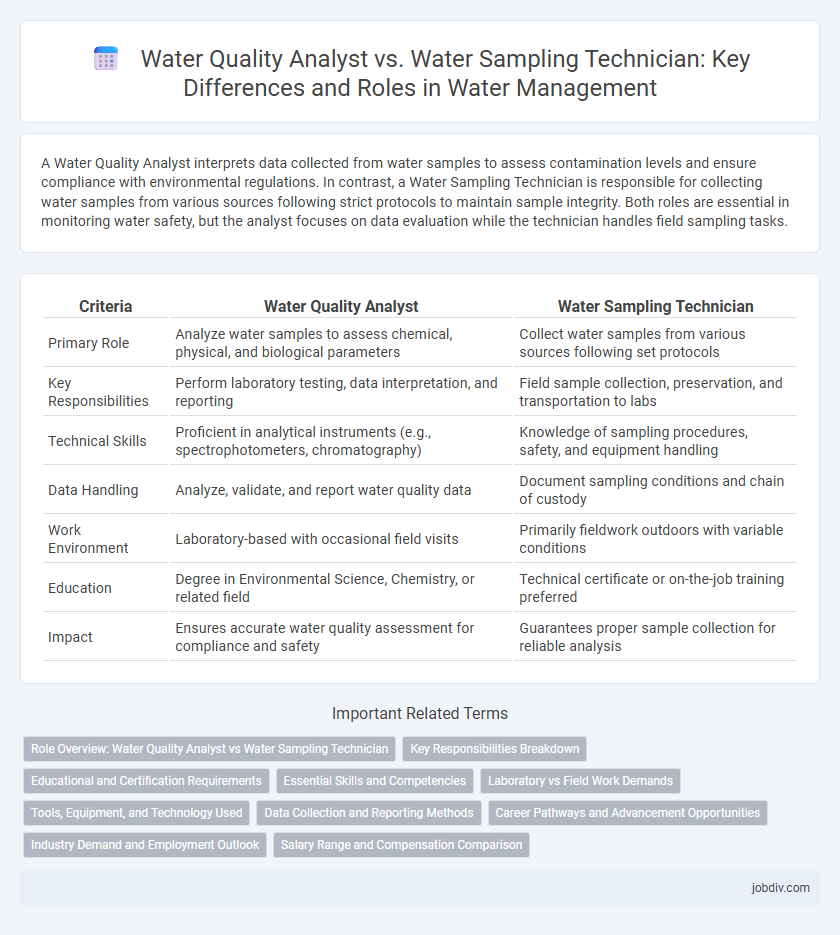A Water Quality Analyst interprets data collected from water samples to assess contamination levels and ensure compliance with environmental regulations. In contrast, a Water Sampling Technician is responsible for collecting water samples from various sources following strict protocols to maintain sample integrity. Both roles are essential in monitoring water safety, but the analyst focuses on data evaluation while the technician handles field sampling tasks.
Table of Comparison
| Criteria | Water Quality Analyst | Water Sampling Technician |
|---|---|---|
| Primary Role | Analyze water samples to assess chemical, physical, and biological parameters | Collect water samples from various sources following set protocols |
| Key Responsibilities | Perform laboratory testing, data interpretation, and reporting | Field sample collection, preservation, and transportation to labs |
| Technical Skills | Proficient in analytical instruments (e.g., spectrophotometers, chromatography) | Knowledge of sampling procedures, safety, and equipment handling |
| Data Handling | Analyze, validate, and report water quality data | Document sampling conditions and chain of custody |
| Work Environment | Laboratory-based with occasional field visits | Primarily fieldwork outdoors with variable conditions |
| Education | Degree in Environmental Science, Chemistry, or related field | Technical certificate or on-the-job training preferred |
| Impact | Ensures accurate water quality assessment for compliance and safety | Guarantees proper sample collection for reliable analysis |
Role Overview: Water Quality Analyst vs Water Sampling Technician
Water Quality Analysts focus on interpreting and analyzing water samples to assess contamination levels, ensuring compliance with environmental and health regulations. Water Sampling Technicians primarily collect water samples from various sources, following strict protocols to maintain sample integrity for accurate laboratory testing. Both roles are essential in monitoring water safety but differ in responsibilities, with analysts concentrating on data evaluation and technicians on field collection.
Key Responsibilities Breakdown
Water Quality Analysts conduct detailed laboratory testing and data interpretation to assess chemical, physical, and biological contaminants, ensuring compliance with environmental regulations. Water Sampling Technicians primarily perform field collection of water samples from various sources, maintaining sample integrity and proper documentation for subsequent analysis. Both roles are critical to the water monitoring process, with Analysts focusing on data evaluation and Technicians on accurate sample procurement.
Educational and Certification Requirements
Water Quality Analysts typically require a bachelor's degree in environmental science, chemistry, or a related field, along with certifications such as the Certified Water Quality Analyst (CWQA) credential. Water Sampling Technicians often need a high school diploma or associate degree with specialized training in water sampling methods and may obtain certification like the National Environmental Laboratory Accreditation Conference (NELAC) accreditation. Both roles demand proficiency in water safety standards and laboratory protocols to ensure accurate monitoring and compliance.
Essential Skills and Competencies
Water Quality Analysts require strong analytical skills, proficiency in laboratory techniques, and the ability to interpret complex data to assess water safety and compliance with environmental regulations. Water Sampling Technicians must excel in field sampling methods, proper sample handling, and adherence to standardized protocols to ensure accurate and uncontaminated water samples. Both roles demand attention to detail, knowledge of water quality standards, and effective communication skills for reporting findings.
Laboratory vs Field Work Demands
Water Quality Analysts primarily conduct laboratory work, analyzing chemical, physical, and biological water samples to assess contamination levels and ensure compliance with environmental regulations. Water Sampling Technicians focus on fieldwork, collecting water samples from various sources such as rivers, lakes, and industrial sites while ensuring proper sampling techniques and preservation methods. The laboratory demands of analysts require strong analytical skills and familiarity with instrumentation, whereas technicians need proficiency in field equipment and adherence to safety protocols.
Tools, Equipment, and Technology Used
Water Quality Analysts utilize advanced laboratory instruments such as spectrophotometers, chromatographs, and digital titrators to perform detailed chemical, biological, and physical water testing. Water Sampling Technicians primarily use field equipment like portable water quality meters, sampling bottles, and flow meters to collect representative water samples from various environments. Both roles increasingly rely on GPS technology and data logging devices to ensure precise location tracking and data accuracy during sample collection and analysis.
Data Collection and Reporting Methods
Water Quality Analysts utilize advanced analytical instruments and software to evaluate water samples, ensuring precise data collection and comprehensive reporting aligned with regulatory standards. Water Sampling Technicians focus on systematic field sampling procedures, maintaining sample integrity and accurate documentation for laboratory analysis. Both roles employ specialized data management systems, but Analysts interpret results and generate detailed reports while Technicians concentrate on field data accuracy and chain-of-custody protocols.
Career Pathways and Advancement Opportunities
Water Quality Analysts typically advance by developing expertise in data interpretation, regulatory compliance, and environmental impact assessments, often moving into supervisory or research roles. Water Sampling Technicians generally begin with fieldwork expertise and can progress to positions involving sample management, quality assurance, or transition into analyst roles by gaining additional technical skills and certifications. Career development in both roles depends heavily on specialized training, relevant certifications such as WQA or CWEA, and experience with water treatment technologies and analytical instrumentation.
Industry Demand and Employment Outlook
The demand for Water Quality Analysts is increasing due to stricter environmental regulations and the need for detailed data interpretation to ensure safe water standards. Water Sampling Technicians face steady employment opportunities driven by routine sample collection in municipal and industrial water systems. Both roles are essential, but Analysts tend to have higher growth potential linked to advanced knowledge and regulatory compliance expertise.
Salary Range and Compensation Comparison
Water Quality Analysts typically earn between $50,000 and $75,000 annually, reflecting their advanced responsibilities in data interpretation and regulatory compliance. Water Sampling Technicians generally have a salary range of $35,000 to $50,000, focusing primarily on collection and basic field testing. Compensation packages for Water Quality Analysts often include higher benefits and performance bonuses due to their specialized skills and analysis duties.
Water Quality Analyst vs Water Sampling Technician Infographic

 jobdiv.com
jobdiv.com